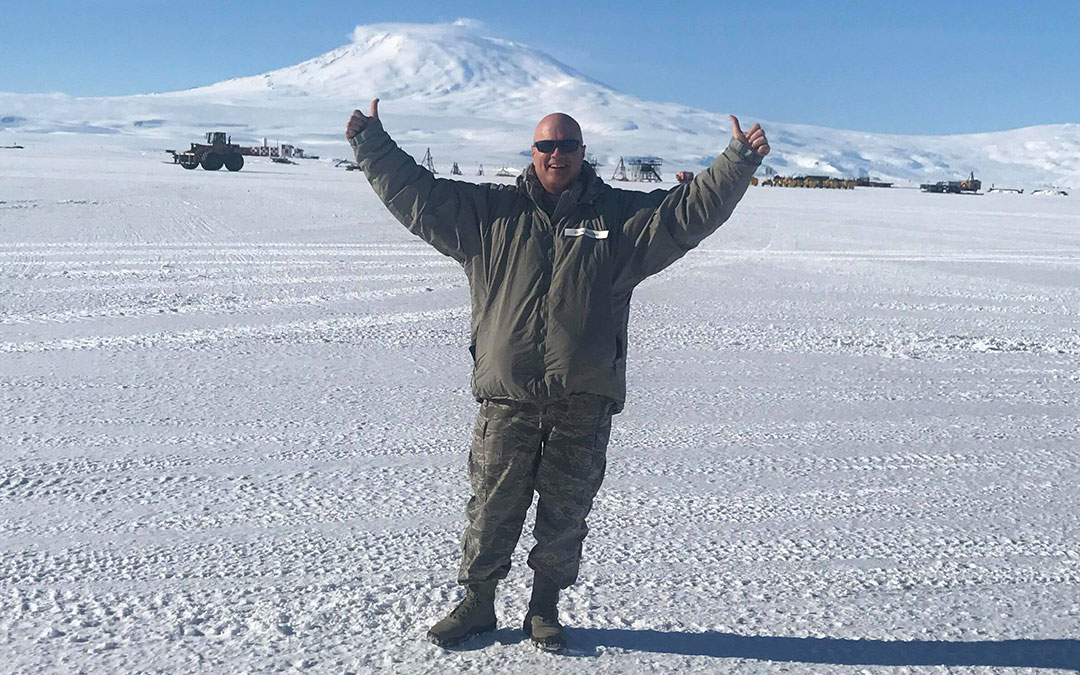Mar 20, 2019 | Alumni, News
Hopkins’ spiritual outreach extends to the ends of the earth

Baker University’s campus minister since 2014, the Rev. Kevin Hopkins spent most of January and February in one of the most remote places of world, 800 miles from the South Pole deployed as part of his U.S. National Guard duties to the McMurdo Station in Antarctica. For nearly two months, Hopkins, known as RevKev to Baker students, served as chaplain at the base that houses about 800 researchers with the National Science Foundation and 100 military personnel.
On Thursday, March 21, at 11 a.m., he will present stories and photos of his trip during the weekly service at Osborne Chapel on the Baldwin City campus.
Known for genuinely caring for others, Hopkins served as a resource to people feeling isolated from the rest of the world. The trek to McMurdo took three days, beginning with a trans-Pacific flight from San Francisco to New Zealand. He spent two days in Christchurch, New Zealand, where he received heavy-weather clothing and supplies.
Two things Hopkins never got used to was 24 hours of daylight and the sense of isolation. “You’re truly at the bottom of the world,” he said. Access to the Internet was mostly nonexistent, and when he could get on, it could take an hour and a half to download one email. He was able to communicate via Facebook Messenger, but couldn’t access his Facebook wall, and he used a calling card to phone and Skype friends and family.
McMurdo, located on glacier ice covered by volcanic lava and 19 hours ahead of Central Standard Time, is in its mild season. For most of his trip, temperatures were in the upper 20s and lower 30s. Temperatures in the area have been known to dip to as low as minus-50 degrees. This time of year, that part of the world experiences daylight 24 hours a day. It has been known to cause depression for the people living there.
“My main responsibilities were to create community life, and I also did a lot of counseling,” he said. “There were a lot of young people there—scientists, environmentalists, and contract workers. So working on a college campus prepared me well for the community down there.”
Luke Miltz, ’17, knew Hopkins would be a perfect fit for the trip to Antarctica. In his student role as a Baker Ambassador, he traveled with Hopkins to area churches and to Thailand.
“He is always up for an adventure, and this one was very unique,” said Miltz, who now serves as an admissions counselor at Baker. “With his experience in past deployments, he is uniquely capable of meeting people where they are in their current situation to provide them the ministry they need. As a person who looks forward to a career in ministry, Kevin is one of my biggest mentors and role models.”
While Hopkins was away in January and February, Miltz led the worship service on Jan. 31 at the Osborne Chapel. Area pastors filled in for the other weekly services.
Darian Eddy, an elementary education major active as a Baker Ambassador, helped coordinate chapel activities during the start of the spring semester.
“I think it is such a great opportunity,” she said. “I cannot wait to hear his stories about his interactions with the people in Antarctica. I’m sure the experience will help him to grow closer to God, and hearing his stories when he comes back will, in turn, grow my faith as well as the rest of the Ambassadors’ faith. This is such a great experience and an honor to serve our country and our God in this way.”
Hopkins is eager to share his experiences on Thursday during chapel.
“I have brought back this incredible knowledge of how vast this planet is and how interconnected we all are,” said Hopkins, who has traveled to all the continents except Australia and Africa. “The scenery around the station was awesome. I saw seals and penguins daily. It was not hard to stay motivated. I had to pinch myself and say, ‘You are really in Antarctica.’”
One highlight of the trip was an 8-hour ride on a military plane to the South Pole. He spent just enough time in the minus-41-degree temperature to walk a loop around the actual south pole, visiting every time zone.
At McMurdo Station, Hopkins led worship services in Chapel of the Snows, known as the most remote active place of worship in the world. The chapel overlooking a bay accommodates close to 70 visitors and is smaller than the Osborne Chapel, he said.
“It’s was a close-knit community here on the bottom of the earth,” said Hopkins. “It’s isolated and the people looked forward to chaplain visits.”
Hopkins won’t have too many more long excursions with the National Guard. He plans to retire in September as lieutenant colonel after 20 years of service.
Eddy admires Hopkins’ contributions abroad and on campus.
“RevKev is a very open-minded person,” Eddy said. “He has always been a great listener. He is also able to connect and build relationships with anybody. He is good with all people and can make connections with new people well.”
These qualities served Hopkins well in Antarctica. “The trip cemented how I feel about having been called to be a chaplain to all faiths and all walks of life and meet people where they are, no matter where they have come from,” he said. And he emphasized how, whether serving scientists and military personnel at the edge of the earth or serving students on a college campus, this philosophy forms the foundation of his ministry.
